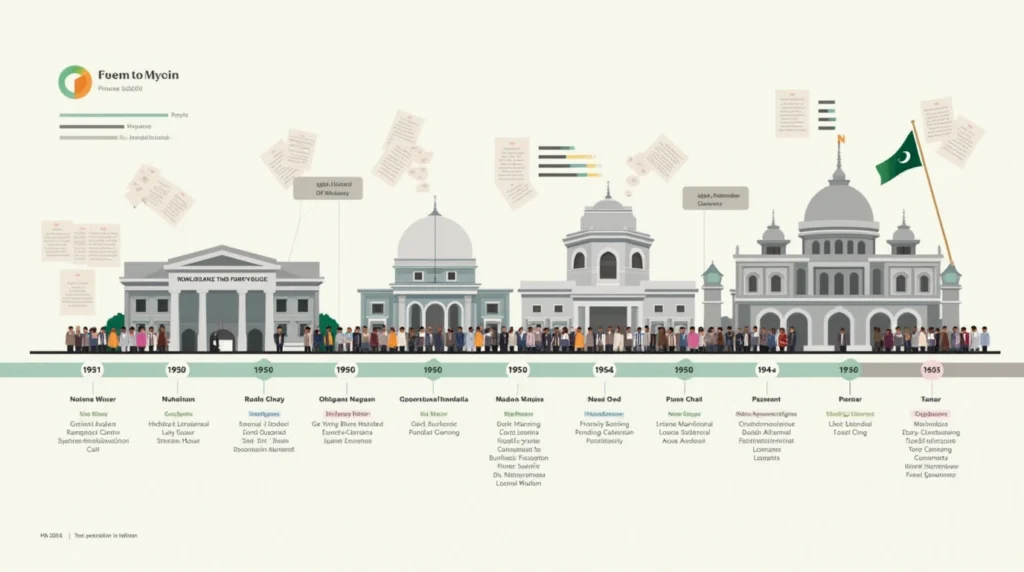The National Finance Commission (NFC) stands as one of the most critical yet often misunderstood institutions within a country’s financial governance framework. What is National Finance Commission exactly? At its core, the NFC is a constitutional body responsible for determining the distribution of financial resources between the federal government and provincial or state governments. This resource-sharing mechanism plays a pivotal role in shaping fiscal federalism and ensuring equitable development across different regions of a country.
Understanding the NFC is essential not just for finance professionals and policymakers, but for citizens who want to comprehend how public resources are allocated and what factors influence regional development disparities. The decisions made by these commissions directly impact everything from infrastructure development and education funding to healthcare services and poverty alleviation programs.
In this comprehensive guide, we’ll explore the structure, functions, and significance of National Finance Commissions, using examples from countries like Pakistan, India, and others where such mechanisms play crucial roles in resource distribution. We’ll also examine how these commissions have evolved over time, the challenges they face in balancing competing regional interests, and the impact of their award decisions on national economic development.
Whether you’re a student of economics, a finance professional, or simply a concerned citizen, this exploration of what is National Finance Commission will provide valuable insights into one of the most important aspects of fiscal governance in modern federal states.

Industry Context: The Financial Governance Landscape
The concept of National Finance Commissions exists within a broader context of evolving financial governance systems worldwide. Historically, the transition from centralized to federal governance structures has necessitated formal mechanisms for resource sharing between different levels of government. The establishment of NFCs represents a critical evolution in this journey toward more structured fiscal federalism.
In recent decades, we’ve witnessed a growing emphasis on transparent and formula-based resource allocation, moving away from arbitrary or politically motivated distribution models. This shift reflects a maturing understanding of how fiscal imbalances can exacerbate regional disparities and potentially threaten national cohesion. What is National Finance Commission if not a response to this fundamental challenge of balanced development in diverse nations?
For finance professionals, understanding NFC dynamics offers valuable insights into public finance management and the political economy of resource allocation. The job market increasingly values expertise in fiscal federalism, with roles emerging in policy analysis, regional development planning, and public finance consulting that specifically require knowledge of how mechanisms like the NFC function.
The stakes are particularly high in developing economies with significant regional disparities. In countries like Pakistan, Nigeria, and India, NFC awards can determine whether historically marginalized regions receive adequate resources for development, potentially breaking cycles of poverty and underdevelopment. Meanwhile, in more developed federal systems like Australia and Canada, similar commissions focus on addressing horizontal fiscal imbalances through sophisticated equalization formulas.
For readers navigating careers in public policy, economics, or governance, comprehending these resource-sharing mechanisms provides essential context for understanding broader development challenges. As decentralization continues to be a dominant trend in governance worldwide, the relevance of institutions like the National Finance Commission only grows more pronounced.

What is National Finance Commission: Core Structure and Functions
Constitutional Foundation and Mandate
What is National Finance Commission at its most fundamental level? The NFC is typically established through constitutional provisions that mandate periodic reviews of financial resource distribution between different tiers of government. In Pakistan, for instance, Article 160 of the constitution mandates the formation of an NFC every five years. Similarly, India’s Finance Commission is established under Article 280 of its constitution.
This constitutional foundation provides the commission with legitimacy and authority, placing resource distribution decisions within a legal framework rather than leaving them subject to ad hoc political negotiations. The mandate typically includes determining the divisible pool of taxes and other revenues, establishing the formula for horizontal distribution among provinces or states, and sometimes addressing vertical imbalances between central and regional governments.
Composition and Appointment Process
NFCs are typically composed of high-level representatives from both federal and provincial/state governments, along with independent experts in economics and public finance. The composition aims to balance technical expertise with political representation to ensure decisions reflect both sound economic principles and regional concerns.
For example, Pakistan’s NFC includes the federal finance minister as chairman, provincial finance ministers, and expert members appointed by the president after consultation with provincial governors. This structure ensures all stakeholders have a voice in the deliberations while maintaining a level of technical rigor in the analysis.
Award Determination Process
The process of determining NFC awards involves extensive data collection, stakeholder consultations, economic analysis, and negotiation. Commissions typically consider multiple criteria in developing their distribution formulas:
- Population: Historically the dominant factor, as areas with larger populations generally require more resources
- Revenue collection: Some formulas reward regions that generate more revenue
- Development indicators: Factors like poverty rates, literacy, and infrastructure gaps
- Geographic challenges: Special considerations for regions with difficult terrain or sparse population
- Historical disparities: Measures to address past underinvestment in certain regions
The relative weighting of these factors is often the subject of intense negotiation, as it directly affects how much funding each region receives. What is National Finance Commission’s most challenging task? Arguably, it’s finding the right balance between competing criteria to create a formula perceived as fair by all stakeholders.
Implementation and Monitoring Mechanisms
Once an award is announced, implementation mechanisms must ensure the agreed formula is applied correctly. This typically involves establishing clear procedures for calculating and transferring funds, along with transparency measures to allow public scrutiny of the process.
Some countries have established permanent secretariats or monitoring bodies to track implementation and address disputes. In more advanced systems, there may be provisions for adjusting transfers in response to changing economic conditions or emergencies, providing flexibility within the established framework.

Evolution of National Finance Commissions Across Countries
Pakistan’s NFC Journey
Pakistan offers an instructive case study in the evolution of resource-sharing mechanisms. Since independence, the country has witnessed nine NFC awards, though several were the result of presidential orders rather than consensus decisions. The progression shows a gradual shift from population-based distribution to multi-factor formulas that consider development indicators and regional challenges.
The 7th NFC Award (2009) marked a particular milestone, as it significantly increased the provincial share of the divisible pool from 47.5% to 57.5%. It also introduced a more complex horizontal distribution formula that, while still heavily weighted toward population (82%), included factors like poverty/backwardness (10.3%), revenue collection (5%), and inverse population density (2.7%).
India’s Finance Commission Innovations
India’s Finance Commission system has evolved over 15 iterations, developing increasingly sophisticated approaches to fiscal federalism. Recent commissions have introduced performance-based incentives, disaster management provisions, and specific grants for sectors like healthcare and education.
The 15th Finance Commission (2020-2025) made notable innovations, including introducing demographic performance criteria, forest cover considerations, and tax effort incentives in its horizontal distribution formula. This evolution reflects growing recognition of the need to balance equity with efficiency and environmental sustainability.
Alternative Models: Australia and Canada
For comparative perspective, Australia’s Commonwealth Grants Commission and Canada’s Equalization Program offer alternative approaches to the same fundamental challenge. These systems focus primarily on horizontal equalization—ensuring all states or provinces can provide comparable levels of public services at comparable tax rates.
What is National Finance Commission’s advantage over these alternative models? NFC frameworks often provide greater flexibility to address country-specific challenges and can more easily incorporate development indicators beyond fiscal capacity. However, they may be more susceptible to political pressures than the more technically driven approaches of Australia and Canada.

Impact and Significance of NFC Awards
Economic Development Implications
The distribution formulas established by NFCs have profound implications for regional economic development. Regions receiving larger transfers can invest more in infrastructure, education, and other development priorities, potentially accelerating growth and poverty reduction.
However, the relationship between transfers and development outcomes is complex. Without adequate capacity and governance at the regional level, increased funding may not translate into improved services or economic opportunities. What is National Finance Commission’s role in addressing this challenge? Some NFCs have begun incorporating performance incentives and capacity-building components to ensure resources translate into development outcomes.
Political Stability and National Cohesion
Beyond economic considerations, NFCs play a crucial role in managing potential regional tensions and promoting national cohesion. In diverse countries with historical regional disparities, perceived fairness in resource allocation can be essential for political stability.
Controversial or delayed NFC awards have sometimes contributed to regional grievances and political tensions. Conversely, consensus-based awards that address legitimate regional concerns can strengthen federal structures and national unity. This political dimension explains why NFC negotiations often receive significant public attention and why governments invest considerable political capital in achieving consensus.
Fiscal Management Challenges
From a macroeconomic perspective, the resource-sharing mechanisms established by NFCs create both opportunities and challenges for fiscal management. Clear and predictable transfer formulas help all levels of government plan their budgets more effectively. However, rigid formulas may limit fiscal flexibility during economic downturns or emergencies.
What is National Finance Commission’s responsibility regarding fiscal sustainability? Progressive NFCs increasingly incorporate considerations of overall fiscal health, sometimes establishing stabilization mechanisms or contingency provisions to address economic shocks. Finding the right balance between predictable transfers and fiscal flexibility remains an ongoing challenge.

Practical Insights: Navigating NFC Dynamics
For Policymakers and Government Officials
For those working in government, understanding NFC dynamics is essential for effective planning and advocacy. Consider these practical approaches:
- Data-driven advocacy: Build compelling cases for your region based on robust data rather than purely political arguments
- Long-term perspective: Focus on structural issues rather than short-term gains in NFC negotiations
- Capacity development: Invest in building the technical capacity to effectively utilize transferred resources
- Complementary revenue strategies: Don’t rely solely on NFC transfers; develop local revenue generation capabilities as well
What is National Finance Commission advocacy most effective when focused on? Evidence suggests that framing arguments around demonstrable inequities or unique regional challenges tends to be more persuasive than general claims of being shortchanged.
For Finance Professionals and Economic Analysts
For those analyzing or working adjacent to NFC processes, consider these insights:
- Beyond the headlines: Look past the headline distribution percentages to understand the nuanced impacts of formula components
- Implementation gaps: Assess not just what resources are allocated but how effectively they’re utilized
- Political economy factors: Recognize that NFC decisions reflect political realities alongside economic principles
- Comparative analysis: Draw insights from how different countries approach similar resource-sharing challenges
Understanding these dynamics can be valuable for roles in economic analysis, policy consulting, and development planning, where the ability to navigate the intersection of economics and politics is increasingly valued.

Real-World Example: Pakistan’s 7th NFC Award
The 7th NFC Award in Pakistan (2009) provides an illustrative case study of how these commissions can address longstanding challenges when political will aligns with technical possibilities.
After years of deadlock and presidential interventions, this consensus-based award made several landmark changes to Pakistan’s resource-sharing framework. It increased the provincial share of the divisible pool substantially and introduced a multi-factor horizontal distribution formula that, while still population-dominated, recognized other important considerations.
The results were significant: provinces received substantially increased resources, allowing for expanded development initiatives. Punjab, despite being the largest province by population, agreed to a slightly reduced percentage share to accommodate concerns from smaller provinces—a notable instance of political compromise in the national interest.
While implementation challenges remained and subsequent NFC awards have struggled to achieve similar consensus, the 7th NFC Award demonstrates how such commissions can, under the right conditions, broker meaningful improvements to resource-sharing arrangements that balance diverse regional interests.
Conclusion: The Evolving Role of National Finance Commissions
What is National Finance Commission’s future in an increasingly complex governance landscape? As countries continue to grapple with questions of equitable development and effective fiscal federalism, these institutions will likely remain central to resource-sharing frameworks while evolving to address new challenges.
Future NFCs may need to incorporate considerations like climate resilience, demographic shifts, and technological transformations into their distribution formulas. They may also need to develop more sophisticated approaches to measuring and incentivizing effective resource utilization rather than focusing solely on distribution.
For citizens and professionals alike, understanding these commissions provides valuable insight into how nations address one of governance’s most fundamental challenges: ensuring all regions and communities have a fair opportunity to develop and prosper. Whether you’re a policy professional, finance expert, or engaged citizen, recognizing the critical role these institutions play in national development enhances your understanding of public finance and governance dynamics.
As you consider your own country’s resource-sharing mechanisms, ask not just “what is National Finance Commission?” but “how effectively does our commission balance competing needs and interests?” The answer reveals much about your nation’s approach to development, equity, and fiscal federalism.
FAQ: Understanding National Finance Commissions
What is the primary purpose of a National Finance Commission?
The primary purpose of a National Finance Commission is to determine how financial resources, particularly tax revenues, should be distributed between the federal government and provincial/state governments, as well as among different provinces or states. This resource-sharing mechanism aims to address both vertical imbalances (between tiers of government) and horizontal imbalances (among regions).
How often are NFC awards typically revised?
The frequency varies by country. In Pakistan, for example, the constitution mandates a new NFC award every five years, though delays are common. India’s Finance Commission is established every five years. Some countries have permanent commissions that make periodic adjustments to distribution formulas.
What criteria are commonly used in NFC distribution formulas?
Common criteria include population size, poverty indicators, revenue generation capacity, geographic area, infrastructure deficits, and development indicators like literacy rates. The specific weight given to each factor varies significantly across countries and over time.
How do NFCs differ from other intergovernmental transfer systems?
Unlike some automatic transfer systems, NFCs typically involve deliberate negotiations between different levels of government, resulting in comprehensive “awards” or “settlements.” They usually consider multiple criteria beyond simple population or fiscal capacity measures and often have constitutional status rather than being purely legislative arrangements.
How can citizens engage with or influence NFC processes?
While NFC deliberations typically involve government officials and appointed experts, civil society organizations, academic institutions, and media can play important roles in informing public debate, conducting independent analyses, and advocating for transparent and equitable formulas. Public pressure can sometimes influence government positions in NFC negotiations.


